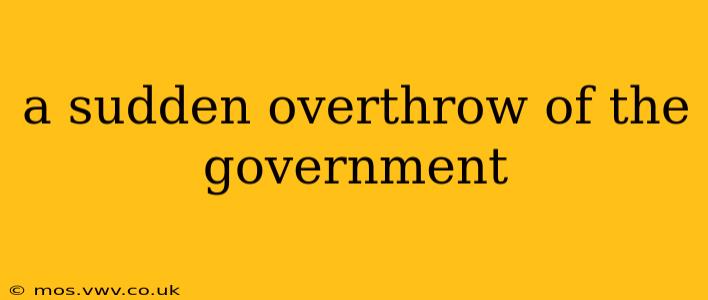A sudden overthrow of the government, often referred to as a coup d'état or revolution, is a dramatic and often violent shift in political power. While seemingly instantaneous, these events are rarely spontaneous. They are the culmination of underlying tensions, simmering discontent, and often a carefully orchestrated plan. Understanding the factors that contribute to such upheavals is crucial to comprehending political instability and its far-reaching consequences.
What are the Key Differences Between a Coup and a Revolution?
This is a crucial distinction often blurred in public discourse. While both involve a seizure of power, they differ significantly in their scope and goals.
-
Coup d'état: This typically involves a swift seizure of power by a small group, often within the military or security forces. The aim is usually to replace the existing leadership with a new regime, often maintaining the existing political system's structure. Coups are often characterized by their swiftness and lack of widespread popular support.
-
Revolution: This is a more profound and protracted process involving a mass mobilization of people against the existing government. Revolutions aim to fundamentally transform the political and social order, often resulting in significant changes to the country's institutions and societal norms. They are characterized by widespread participation and a struggle for a new vision of the state.
What are the Common Causes of a Sudden Overthrow of Government?
Several factors can contribute to the fragility of a government, making it vulnerable to a sudden overthrow.
-
Political Instability: Weak or corrupt leadership, lack of accountability, and deep political divisions create fertile ground for unrest. When a government loses the legitimacy and support of its people, it becomes vulnerable to challenges.
-
Economic Crisis: Widespread poverty, inequality, and economic hardship can fuel social unrest and provide the impetus for radical change. A struggling economy can erode public trust and provide an opening for those seeking to seize power.
-
Social Inequality: Significant disparities in wealth, access to resources, and opportunities can lead to widespread resentment and anger, creating a climate ripe for rebellion. Perceived injustice and lack of social mobility often fuel revolutionary movements.
-
Military Intervention: A strong and ambitious military can pose a significant threat to a civilian government. If the military feels its interests are neglected or threatened, it might intervene to seize control, especially in countries with weak civilian oversight.
-
Foreign Influence: External actors can play a role in destabilizing a government. This can involve supporting opposition groups, funding protests, or even direct military intervention. Foreign interference can significantly exacerbate internal tensions and contribute to regime change.
What are the Long-Term Consequences of a Sudden Overthrow of the Government?
The aftermath of a coup or revolution can be devastating.
-
Political Instability: The new regime might face challenges in consolidating its power, leading to further instability and conflict. The absence of legitimate authority often creates a power vacuum, susceptible to further upheaval.
-
Economic Decline: Political instability often leads to economic disruption, including capital flight, decreased investment, and a decline in economic activity. The uncertainty surrounding the new regime can deter investors and hinder economic recovery.
-
Human Rights Violations: Coups and revolutions often result in significant human rights abuses, including violence, imprisonment, and extrajudicial killings. The absence of rule of law and accountability often allows for widespread abuses.
-
Civil War: A sudden overthrow of the government can trigger a civil war if different factions struggle for control. This can lead to prolonged violence, displacement, and humanitarian crises.
How Can Governments Prevent Sudden Overthrows?
Preventing a sudden overthrow requires a multi-faceted approach:
-
Good Governance: Promoting transparent and accountable government, respecting the rule of law, and ensuring fair elections are crucial in building public trust.
-
Economic Development: Creating inclusive economic opportunities, reducing inequality, and fostering economic growth can help alleviate social tensions.
-
Strong Institutions: Establishing independent and effective institutions, including a judiciary and civil society, can help prevent the abuse of power and maintain stability.
-
Dialogue and Reconciliation: Facilitating open dialogue between different groups and promoting reconciliation can help address underlying grievances and prevent violent conflict.
A sudden overthrow of the government is a complex event with far-reaching consequences. Understanding its causes and potential outcomes is vital to fostering political stability and promoting sustainable development. It requires proactive measures to address underlying issues and build resilient and inclusive societies.
